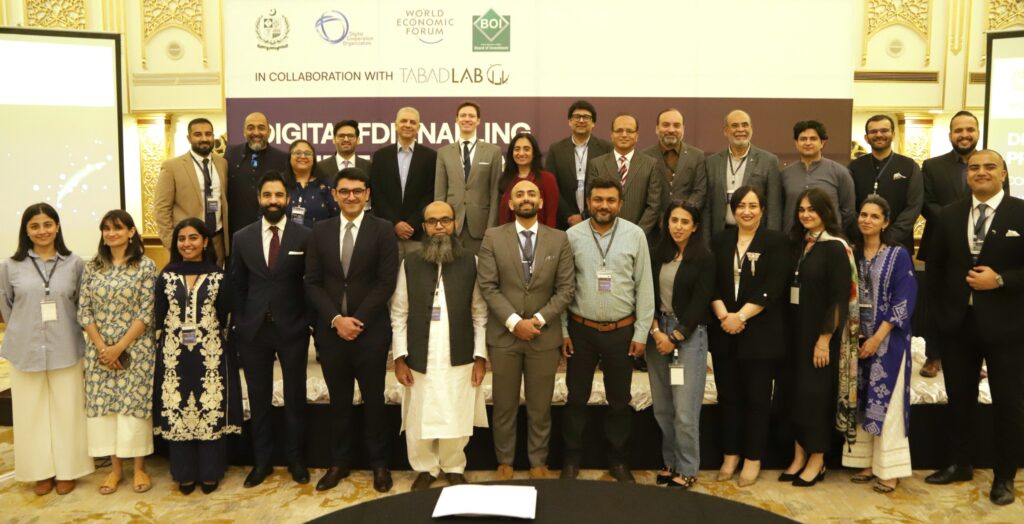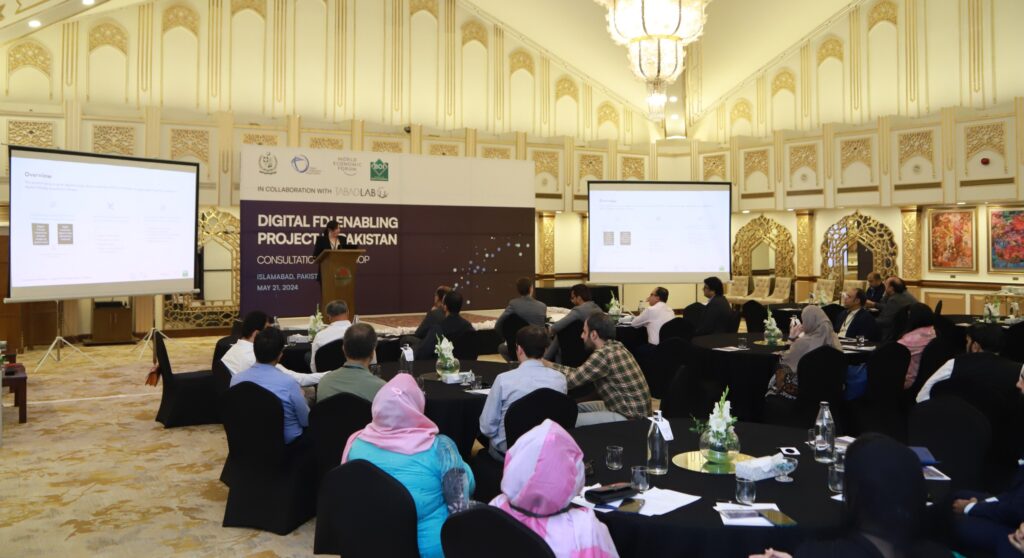Published on 22 May, 2024
DCO held a consultative workshop for the Digital Foreign Direct Investment (FDI) Enabling Project in Pakistan

ISLAMABAD, Pakistan – 22 May: The Digital Cooperation Organization (DCO), in collaboration with the World Economic Forum, the Board of Investment (BOI), the Ministry of Information Technology and Telecommunication (MoITT) and Tabadlab in Pakistan, held a consultative workshop for the Digital Foreign Direct Investment (FDI) Enabling Project in Islamabad, the capital of Pakistan. Participants included key stakeholders from the public and private sectors working in Pakistan’s digital economy. The discussion centred the creation of an enabling environment to increase digital foreign direct investment in Pakistan.
The event aimed to shortlist key priority actions from a rich repository of 55 policy options emerging from the Digital FDI Enabling Project – this encompassed over 70 consultations in Pakistan and a survey of 100 investors operating in the market. This initiative is reflective of the Government of Pakistan’s steadfast commitment to fostering economic growth, particularly within the digital realm, and seeks to direct more FDI towards Pakistan’s digital activities.
Manel Bondi, Chief of Digital Markets Growth, Digital Cooperation Organization said: “Our goal with the Digital FDI Enabling Project is to lay the groundwork for a thriving digital investment landscape in Pakistan. This workshop was a crucial step towards aligning policies that attract and sustain digital investment.”
Matthew Stephenson, the head of Investment and Services at WEF, said: “The workshop today is a culmination of over a year’s work of research and consultations, and we are now at the stage of understanding Pakistan’s priorities to grow digital FDI, and supporting the implementation of enabling actions.”

Farooq Ahmed Cheema, Director (Multilateral Organization), Ministry of IT & Telecom remarked that “the productive discussions held at today’s consultative workshop on Digital FDI in Pakistan demonstrate a growing recognition of the country’s immense potential in the digital sector. The Ministry of IT & Telecom is fully committed to fostering a conducive environment that attracts foreign investment and fuels the growth of our thriving tech industry. This will not only facilitate innovation and economic growth, but also create exciting new opportunities for Pakistanis and global partners alike.”
Tabadlab’s Founding Partner and Head of Advisory Umar Nadeem said: “Pakistan’s digital promise requires a holistic and coherent approach to yield dividends for a young population. The digital FDI initiative presents a unique opportunity to grow the digital economy, address Pakistan’s fiscal challenges and accelerate progress for improving socioeconomic outcomes.”
BOI Director Mehmood Tufail appreciated the direction of the conversation: “It is imperative to work towards a way forward. An implementation plan should be highlighted and truly implemented in letter and spirit by the government entities in consultation with the stakeholders.”
For media inquiries, please contact media@DCO.org
The policy options under consideration covered a broad spectrum of themes, including institutional architecture, regulatory environment, incentives for digital infrastructure, a digital-centric tax regime, and bridging the academia-industry gap. The workshop emphasised the significance of several key initiatives: establishing stable tax policies and aligning tax incentives with digital development goals, creating a unified digital system to connect government ministries, developing data-sharing mechanisms, boosting Pakistan’s competitiveness in the regional and international investment landscape, and cultivating a skilled workforce through specialised digital training programs.
The insights gathered from the workshop will inform the Digital FDI Enabling Project’s strategic direction and activities over the coming year, propelling Pakistan towards a more robust and inclusive digital economy poised for sustained growth and prosperity.
